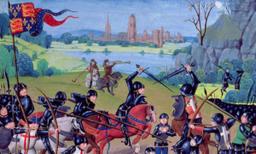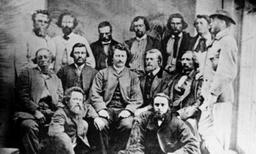Gerry Bowler: The Battle that Preserved Greek Civilization
Commentary
In the year 490 BC, a Persian army invaded Greece, aimed at the destruction of the city of Athens which had earlier helped Greek subjects of the Persian empire to rebel. This force was defeated at the Battle of Marathon, but the Persian emperors did not give up on their plans to subdue the Greeks.
The second great Persian incursion into Greece in 480 BC saw the invaders victorious on land at Thermopylae, where they defeated the Spartan king Leonidas (portrayed in the movie “300”) and burnt down Athens, but were defeated at sea at Salamis. Emperor Xerxes had returned to Asia, but he had left a large army under Mardonius, which he expected to complete the conquest of Hellas the following year.
Mardonius had been instrumental in putting down rebellions by Greek cities in Ionia but he had not been chosen to be part of the first doomed Persian expedition at Marathon. He was said to have been the driving force at the court of Xerxes in convincing the Emperor to undertake another assault on the Greek mainland.
In the early part of 479 BC, Mardonius invested great effort in trying to pry Athens away from its coalition with the other cities who still defied Persia—Greeks were notoriously unstable in their alliances—but was unsuccessful. Consequently, he moved south into Attica, occupied Athens, and sacked it again. This prompted the surviving Athenians to demand that Sparta and its allies act. They argued that it was the Athenian navy which had protected the Peloponnesus the year before and if they didn’t get the military support they needed they would agree to Persian terms.
The Spartans responded, and their general Pausanias led a multi-city force of hoplites (bronze-armoured infantry) and archers north against the Persians. Mardonius was reluctant to fight in the hilly terrain around Athens and so withdrew to the Boeotian plain where his cavalry could perform better.
On Sept. 22, the two armies clashed outside Plataea. The troops of Mardonius were more numerous, including in their forces fighters from all across their empire as far away as India, as well as Greeks from cities who had “medized” (bowed the knee to Persia). The Greeks on the other hand were more heavily armoured and in this mismatch they prevailed, killing the Persian general, routing his army, and taking massive amounts of booty.
Two tales from the Battle of Plataea need to be told.
The first concerns Aristodemus, a Spartan infantryman who had been part of the 300-hoplite force that guarded the pass at Thermopylae against the full force of the Persian invasion in 480 BC. He and a companion, Eurytus, had been stricken with an eye disease which nearly blinded them and been sent away from the fighting by King Leonidas.
Eurytus, feeling guilty, turned back to join his unit, but perished when the Spartans and their allies were wiped out. Aristodemus, on his return to Sparta, was treated with contempt for not having done the same. The historian Herodotus recounts that “no man would give him a light for his fire or speak to him; he was called Aristodemus the Coward.” The same treatment was meted out to another soldier, Pantites, who had been dispatched from Thermopylae with a message; he was so soundly abused that he committed suicide.
When Spartan troops encountered the Persians again at Plataea the following year, Aristodemus was determined to wipe out his shame. He fought with suicidal frenzy and died. After the battle, Herodotus said there was discussion about who had fought most bravely:
According to my judgment, he that bore himself by far the best was Aristodemus, who had been reviled and dishonoured for being the only man of the three hundred that came alive from Thermopylae; and the next after him in valour were Posidonius and Philocyon and Amompharetus. Nevertheless when there was talk, and question who had borne himself most bravely, those Spartans that were there judged that Aristodemus had achieved great feats because by reason of the reproach under which he lay he plainly wished to die, and so pressed forward in frenzy from his post, whereas Posidonius had borne himself well with no desire to die, and must in so far be held the better man. This they may have said of mere jealousy; but all the aforesaid who were slain in that fight received honour, save only Aristodemus; he, because he desired death by reason of the reproach afore-mentioned, received none.
The second story concerns the pillar which was erected in the heart of the Old City in Istanbul.






